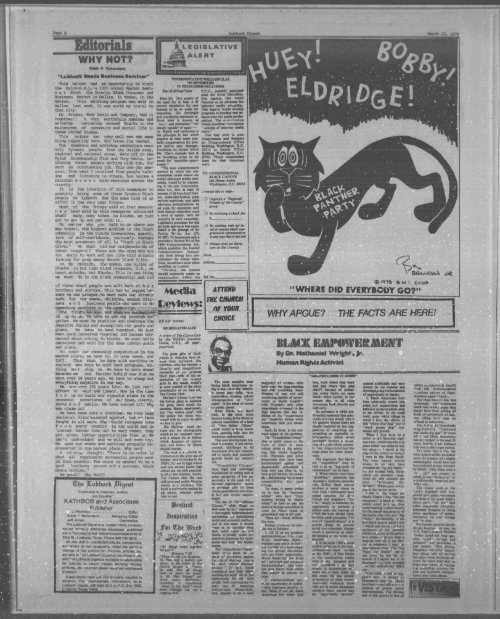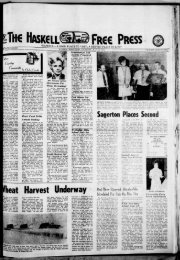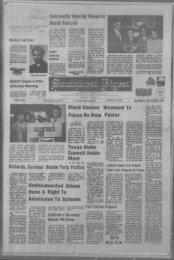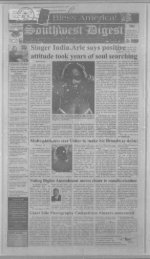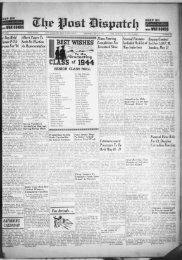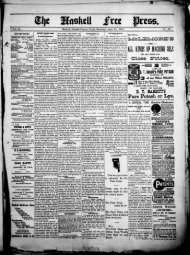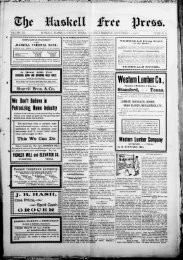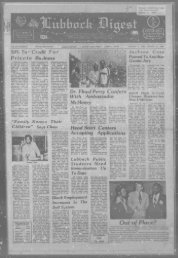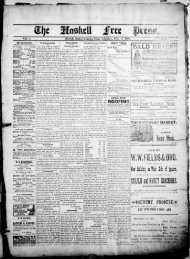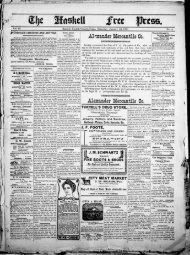Create successful ePaper yourself
Turn your PDF publications into a flip-book with our unique Google optimized e-Paper software.
Pag 4 Lubfcock Digest March 23, 1978<br />
ltorials<br />
ill'iiiiww.T J<br />
LEGISLATIVE<br />
WHY NOT?<br />
Eddie p. Richardson<br />
"Lubbock Heeds Business Seminar<br />
This writer had an opportunity to visit<br />
the Elylon-N.B.- L. 's 13th annual Market Seni--n<br />
a r About the Growing Black Consumer and<br />
Business Market in Dallas, ift <strong>Texas</strong>, in the<br />
Nation. This exciting program was held in<br />
Dallas last week. It was worth my travel to<br />
that city.<br />
My friend, Tony Davis and Company, had it<br />
together il A very worthwhile seminar and<br />
workshop centering around Blanks in the<br />
mainstream of economics and social life in<br />
these United States.<br />
This writer can very well see the same<br />
thing happening here. God knows its needed.<br />
The speakers and workshop conductors were<br />
very dynamic people from the Dallas area,<br />
regional and national areas. Hats off to the<br />
Pylon Salesmanship Club and Tony Davis, including<br />
those people working with him, for<br />
such an outstanding job. This one day session,<br />
from what I received from people talking<br />
and listening to others, has become a<br />
national event with meetings across the<br />
country.<br />
It is the intention of this newspaper to<br />
possibly bring some of these dynamic Black<br />
people to Lubbock for the same kind of an<br />
effort in the very near future.<br />
Most, of the things said at that. session<br />
has been said by this newspaper editorial<br />
staff many, many times c As Blacks, we just<br />
got to get up and get with it.<br />
No matter who you talk to or where one<br />
may travel, the biggest problem in the Black<br />
community is the Blacks themselves, apathy,<br />
lack of self-confiden-<br />
ce, jealously. Perhaps<br />
the most paramount of all is "Black on Black<br />
Crime." We must rid our neighborhoods of<br />
these nigger si.' These are the ones who are<br />
too sorry to work and are like wild animals<br />
looking for prey among decent Black folks.<br />
In my opinion, the number one killer of<br />
Blacks is not high blood pressure, T.B., or<br />
heart attacks, but Blacks. This is one thing<br />
we must do in the Black catmunity, .get rid<br />
of these cruel people who will hurt ot h'js r<br />
brothers and sisters. This has to happen be- -<br />
fore we can 'prosper .We must make our streets<br />
safe for our women, children, senior citizens<br />
and business people who want to do<br />
i f in<br />
,P$The fnture$isov7i andJ'what?<br />
is up to us. we nave<br />
to qet our Drocrram to<br />
gether. We must be positive and overcome the<br />
negative forges and accomplish our goals and<br />
plans. We have to band together. We just<br />
must .band ourselves together and become concerned<br />
about voting in blocks. We must unite<br />
ourselves and work for the same conrnon goals<br />
1 1 AWWWiJubkUM<br />
and plans.<br />
. To make our carmunity competitive in the<br />
market place, we have to, in some cases, get<br />
$uff This must be done with anytliing or<br />
anybody who trys to hold back progress. Nothing<br />
must stop us. We have to move ahead<br />
because we are .<br />
behind now than we<br />
further<br />
were over 20 years ago. We have to stamp out<br />
everything negative in our way.<br />
We are over 300 years late. We just can't<br />
afford to wait any longer. Now is the time<br />
for us to claim our rightful place in the<br />
economic structures of our town, county,<br />
state and nation. We have earned it! ! Why<br />
hot claim it?<br />
We have been here a longtime. We have been<br />
enslaved, discr.iMnated against, but have<br />
fought in all wars. Why should refugees come<br />
f ;<br />
r o ra every country in the world and be<br />
treated better than us? In many cases, they<br />
are given better opportunities than us. We<br />
(isn't understand and we will not even try.<br />
we want our goods and services properly represented<br />
in the market place. Why ' not? .<br />
A closing thought: "There is no color in<br />
what all aggressive successful people want<br />
in this country. The color is green! To be a<br />
good business person and a success, Black<br />
means nothing."<br />
Be good! ! Why Not??<br />
"Dedicated to Freemen, Justice<br />
and Equality"<br />
KATHBOB and Associates<br />
Publisher<br />
. J. Patterson Editor<br />
Eddie P. Richardson Managing Editor<br />
Jeff Joiner .....Distribution<br />
The Lubbock DIgost is an Independent, privately-owne- d<br />
mborlty enterprise newspaper published<br />
every Thursday by Katf ;bob and Associates at 503 E.<br />
23rd St., Lubbock, <strong>Texas</strong>. Phone<br />
806-762-36- 12.<br />
All non3taff or unsolicited articles, manuscripts,<br />
and letters do not necessarily reflect the stend or<br />
feelings of this publication. Pictures, articles, etc.<br />
are sent to the Lubbock Digest at the ovyner's i.sk,<br />
and The Lufib'ock Digest Is not liable or responsible<br />
for custody or return. People, wanting articles",<br />
pictures, etc. returned please send<br />
self-address- ed,<br />
envelope.<br />
Subscription rate are $10 annually, payable in<br />
advance, For advertisement Information, write:<br />
Lubbock Digest, 506 East 23rd or P.O. Box 2553,<br />
Lubbock. <strong>Texas</strong> 79408,<br />
it<br />
El f '.TOW<br />
II is! ALERT<br />
fin<br />
&.T.<br />
REPRESENTATIVE WILLIAM CLAY<br />
ON MINORITIES<br />
IN TELECOMMUNICATIONS<br />
Part II of Four Farts F.C.C., possibly patterned<br />
after the Rural Electrifica-<br />
Here Mr Clpy speaks of tion Agency, that would<br />
the need for at least a 20 function as an advocate for<br />
percent stipulation for new minority media ownership.<br />
Ocsnses to be set aside for This Agency would develop<br />
minorities. His forthright programs to Increase and m-and<br />
convincing statement re-- nance minority media partld<br />
pation. The orpnnl7tlon<br />
would coordinate interagency<br />
"uancing of minority media<br />
entry."<br />
You may write to your<br />
Congressmen and Senators<br />
at: Congressional Office<br />
Building, Washington, D.C.<br />
20515 or Senate Office<br />
Building, Washington, D.C.<br />
20510. Please congratulate<br />
them for their important<br />
work.<br />
fleets what is known as<br />
cqu;i . and restitution' not<br />
simply equality of oppoj""'<br />
ity. Equity and restitution is<br />
the principle in law which<br />
requires at least some symbolic<br />
compensation for present<br />
andor past damages.<br />
Doubtless we should follow<br />
Mr. Clay's example here in<br />
an increasing stress on the<br />
needs for "equitable opportunity."<br />
"The most comprehensive<br />
method by which this subcommittee<br />
could ensure minority<br />
electronic media ownership,<br />
would be by stipulating<br />
in the new Communications<br />
Act, thnt at least 20<br />
percent of all broadcast licenses,<br />
multi-distributi- point<br />
services approvals, and cable<br />
television authorizations, be<br />
set aside for minorities until<br />
such time as minorities reach<br />
a level of equity, with the<br />
majority in such ownership.<br />
Legislative precedent for this<br />
set aside approach was estate<br />
lished in the passage of the<br />
Public Works Act (PL<br />
95-28- 7). To implement such a<br />
procedure, Section 310 of the<br />
1934 Communications Act,<br />
which prohibits the Federal<br />
Communications Commission<br />
from taking into consideration<br />
the license transferee,<br />
would have to be either<br />
modified, or omitted.<br />
"Further, the statute<br />
should statutorily create an<br />
organization, within the<br />
Media<br />
Reviews:<br />
L1<br />
(Of wide interest<br />
SEGREGATED JAZZ<br />
A reyiew of TheCqtJon Club<br />
'<br />
by Jim Hoslcins (Random<br />
House, N.Y.), 180 page?,<br />
paperback<br />
The great gifts of black<br />
people in America have always<br />
been exploited. Jim<br />
Koskins who has become a<br />
faithful and magnificent<br />
chronicler of our precious<br />
black past tells of the exploitation<br />
of our musical<br />
gifts in the music world's<br />
greatest symbol of the whits<br />
prostitution of our best art,<br />
The Cotton Club.<br />
Harlem's Cotton Club was<br />
the hottest place in America<br />
for great black music for<br />
decades. Blacks entertained,<br />
but "for whites only" was<br />
the policy for those who<br />
would wish to enjoy the gifts<br />
we had to give.<br />
Jim Haskins word pictures<br />
and the photography<br />
which he has amassed represent<br />
a unique bit of history<br />
which despisers of oppression<br />
and lovers of liberty<br />
should cherish.<br />
The book is a colorful introduction<br />
to the great age of<br />
harlem, with its heyday in the<br />
1920s, fo- - use by hjgh school<br />
and very serious junior high<br />
school use, As with practically<br />
all of Jim Haskins books,<br />
The Cotton club fits into<br />
collegiate and public libraries<br />
almost as a necessity. This<br />
book is well worth reading by<br />
all adults, whether music<br />
fans or not.<br />
ptrtical<br />
Jfqt tEhe Wttb<br />
"AW things work together<br />
for good"<br />
, --Romans 8;28<br />
Words Are Realistic,<br />
St. Paul was- -<br />
a realist; end<br />
when, in, his letter to the<br />
church people h. Rome,<br />
,he said that all thlngi<br />
lead to good, he meant<br />
it. St. Paul himself suffered<br />
many difflcultiep,<br />
Including a mysterious<br />
fchorn n the flesh" which<br />
some jokingly say was a<br />
nagging wife.<br />
TO: CONGRESSIONAL<br />
BLACK CAUCUS<br />
306 House Annex<br />
Washington, D.C. 20515<br />
I would like lo help<br />
Name.<br />
Organize a "Regional<br />
Friends of the Caucus<br />
group<br />
By enclosing a checkfor<br />
$ : .<br />
By working with my local<br />
or nearest black congressional<br />
representative<br />
in any way that is neci!ed<br />
Address.<br />
(Please send me literature<br />
on the Caucus)<br />
Tel. No..<br />
m CHURCH<br />
OF YOUR 1<br />
CHOICE<br />
' "<br />
Ths most sensitive issue<br />
facing black Americans today<br />
is not as in the relatively<br />
recent pastjobs, voter<br />
registration, housing, school<br />
desegregation or "civil<br />
rights" in the sense of access<br />
to public places.<br />
What blacks ae faced<br />
with, in the most acute<br />
fashion today,' is the direct or<br />
indirect imposition of a kind<br />
of "Grarifatber Clause"<br />
which works to keep blacks<br />
from entering fully into the<br />
American mainstream.<br />
This new development represents<br />
u mnjcr, if not monumental,<br />
challenge to all<br />
Americans who are committed<br />
to equity and peaceable<br />
growth within our nation's<br />
life.<br />
"Grndfather Clauses"<br />
were legal and semilegal<br />
stipulations in voting and in<br />
some categories of job opportunity<br />
in ths past which<br />
allowed registration, access<br />
or privilege only to those<br />
whose grandfathers previously<br />
lud met certain requirements.<br />
The us of "Grandfather<br />
Clauses," while; illegal on<br />
their past forms," represents<br />
a thoroughly understandable<br />
mechanism for maintaining<br />
social and economic stability;<br />
and in this sense it should<br />
"ome as no surorise when<br />
their spirit takes on' rrw<br />
forms, especially under tremendous<br />
pressures for major<br />
social and econ mic adjustments.<br />
The "Grandfather Clause"<br />
battle today takes on the<br />
cloik of protection against<br />
the evils of what hes ome to<br />
be tailed "reverse discrimU<br />
nation." Of late, black<br />
Americans and their allte,<br />
working for equitable or just<br />
opportunity for Mil. have<br />
sought fresh ctechftBlsms for<br />
entry into thi American<br />
mainstream, Meanwhile,<br />
whs appears to be a vocal'<br />
-ii<br />
."<br />
ma b m ccop<br />
"WHERE DID EVERYBODY GO?"<br />
mAH&JE? THE FACTS ARB HEfiE! j<br />
"""" --i..i'Tr'""'""" 'L"lJJi iii'" "r;""'!S'''' """"""<br />
Bf Br Nathan!! Wright,<br />
Human nights Jtetivtet<br />
majority of whites who<br />
have been the long-standiand<br />
still unyielding beneficiaries<br />
of past and still<br />
continuing denials of opportunity<br />
to blacks (together<br />
with HIspanics and other<br />
minorities) screamed to the<br />
high heavens that any<br />
of the "opportunity<br />
pie" implicitly denies white<br />
Americans their just inheritance.<br />
Such, in brief, is the outward<br />
aspect of the problem.<br />
The "Grandfather Clause"<br />
idea or spirit comes in the<br />
form of many or most<br />
whites while re Jily admitting<br />
that blacks (together<br />
with Hispanics and other<br />
minorities) may have been<br />
discriminated against and<br />
disgracefully mistreated a<br />
long time ago (that is, by<br />
their grandparents, for example),<br />
still denying my present<br />
responsibility for past<br />
wrongs.<br />
To them, it seems unfair<br />
on its face for "innocent<br />
whites" who have "done<br />
nothing ' wrong to blacks<br />
today." to have to pay the<br />
price of wrongs committed in<br />
some (to them) vague or<br />
generalized way in the past.<br />
There are difficulties<br />
here.<br />
Perhaps the two n iost obvi-ous<br />
are as follows<br />
1. All of us are products<br />
and beneficial ies of ou. pastr<br />
White Americans enjoy<br />
whether they like it or not<br />
tue bsnf fits of a<br />
long-standi- ng<br />
end grossly discriminatory<br />
pro-whi- te opportunity.<br />
White Amerlsanr are ftced<br />
with inherited and presently<br />
institutionalized oppcrtuni-tie-s<br />
oyer blacks from which<br />
they<br />
cape,<br />
cannot at present es-<br />
2, Institutionalized pro-wji- ie<br />
opportunity or preferential<br />
treatment persists toddy.<br />
Most, If not all, black,<br />
Americans 'live where they<br />
,<br />
v<br />
i .n i ii<br />
-- '<br />
"GRANDFATHER CLAUSES"<br />
live, work where they work<br />
and play where they play<br />
chiefly bectuse of presen?<br />
day unfair limits set upon<br />
blacks which accrue, in our<br />
present day, to all white<br />
Americans both directly and<br />
indirectly.<br />
So pervasive is white preferential<br />
treatment that practically<br />
al whites simply take it<br />
for granted. Hence many are<br />
deeply resentful at any suggestion<br />
of anything approaching<br />
an equitable rearrangement,<br />
which would<br />
inevitabjv involve a<br />
of L.c pie which presently<br />
has disproportionately<br />
large slices for white Ameri<br />
cans,<br />
The argument that blacks<br />
are "unqualified" may be<br />
said to be an "argument of<br />
convenience" on its face.<br />
1. Where blacks have been<br />
"qualified," unionism has<br />
mposed a fictitious seniority<br />
rule. Skilled black cement<br />
workers in many places in<br />
New York traditionally have<br />
muted concrete for their<br />
friends and neighbors "for<br />
free," simply to celebrate the<br />
Opportunity to perform a<br />
skilled trade, the exercise of<br />
which has been denied them<br />
by white trade unionism. Tie<br />
ruse of "qualifications" is a<br />
prpven dodge to prevent<br />
social And economic change<br />
which is perceived as either<br />
threatening or otinvise undesirable<br />
2. in the early 1 SCO's, most<br />
skilled crpftsmen to the Unit<br />
cd States were black As late<br />
as the 1920':., sUUed blacks<br />
In the construction trades<br />
were tr iten, harassed and<br />
eve" murdered y'.eii they<br />
sought to demonstrate art3<br />
make use of their skills, In )<br />
this sttise, the last several<br />
generations of white Amenk<br />
cans and especially those<br />
who are of recent immigrant<br />
ancestry have moved into<br />
an "opportunity vacuum"<br />
Jr.<br />
created artificially and atrociously<br />
by the massive and<br />
thoroughgoing forced denials<br />
of opportunity to blacks.<br />
3. Black Americans have<br />
been arbitrarily cowed into<br />
many low expectations and<br />
behavior patterns which seem<br />
to say defeat. In the small<br />
rural, poor white village in<br />
which I live, the effects of<br />
this "white chief dog" and of<br />
"black puppy dog" syndrome<br />
still prevail.<br />
When I fiiat went to a<br />
rather roagh Saturday night<br />
beer hall which waj the ouly<br />
place within ten miles to buy<br />
hot pizza; I stood at the<br />
edge of the counter as though<br />
I were in the Deep South.<br />
The beer happy whites<br />
would, in no wise, have<br />
tolerated an "uppity black."<br />
On my second visit, fortunately<br />
our postman recognized<br />
me and shouted put<br />
loud, "Welcome, Dr.<br />
Wright!" Whereupon every<br />
one in the tavern arose.<br />
a was a 'big Negro<br />
black). Hence I was "the one<br />
exception," a black to which<br />
whites could look up, thus<br />
compensating in their minds)<br />
for the demeaning dene to all<br />
the others who were not "big<br />
Wacks.' Incidentally, in the<br />
anti-blac- k area in which I live<br />
which may be seen ai but a<br />
caricature of the partially<br />
hidden atdiudes of the nation<br />
as a whole always keep a<br />
snap.on bow tie in my shirt<br />
poc&et whenever I wewon<br />
openrnecKed shirt, The "big<br />
Negro (or black)" getup<br />
can never be top far removed,<br />
if I expect not to be<br />
deirteanedT-- 6r even arrested<br />
in amn entirely unjestifjed<br />
waj; rom whatf ,s said or suggested<br />
here, it should bt<br />
abundantly clear thiU blacks<br />
have been and still are 1 56<br />
subjects of grossly unfair<br />
discrimination. The obverse<br />
side of this picture is that all<br />
whites unconsciously benefit ,<br />
from this institutionalized<br />
American pattern of discrimination<br />
against blacks.<br />
For those hard to hear but<br />
immensely<br />
sould who would argue that'<br />
blacks have been getting all<br />
kinds of advantages of late,<br />
two telling fort may be<br />
offered in refutation.<br />
One is that ihc historically<br />
long-standin- g, "unclosed<br />
and uncloaing gap" between<br />
wh'.ie and black Americans<br />
has not budged in the past 25.<br />
years. Indeed, it has widened<br />
a bit over a thirty year period.<br />
Ths other fact is thai the<br />
fresh opportunities attendant<br />
upon the creation of a highly<br />
technological world have not<br />
been enjoyed propoitionately<br />
by blacks. Thus when even a<br />
"n" pie" was created src--.<br />
centlyjt was "divided up";ht<br />
a traditionally American pro-whi- te<br />
way.<br />
The major probkm for-blac-<br />
(together with Hispanic<br />
apd pther minorities)<br />
has been a too treat dependence<br />
upon "the law" and<br />
other supposedly automatic<br />
processes designed to bring'<br />
some semblance of equity,<br />
restitution for past wrongs'<br />
and fir play.<br />
But human societies simply<br />
do not function t way. As<br />
U.S. Representative Barbara<br />
Jordan noted not long ago,<br />
only "puhlk outrage and<br />
pressure" will guarantee a<br />
just society. Thus blacks,<br />
Hispanics pnd other minoritiesalong<br />
with all seeking<br />
fair play must doubtless be-com- e<br />
far more amerable to .<br />
fresh expressions of outrage<br />
and unyielding pressure before<br />
any equitable readjust- -<br />
menfs may come about.<br />
HI<br />
1 Wm<br />
'<br />
I


